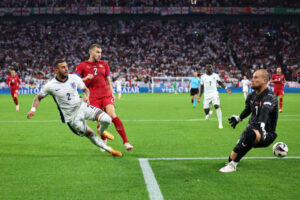A lot of people had expected the gap between opening Euro 2024 group stage games against Serbia and Denmark to be dominated by talk of whether Cole Palmer should start. But we had even long planned for such an eventuality, as is the predictable nature of the noise around the Three Lions.
Alexander-Arnold has been used largely, though not exclusively, by England as a midfielder over the last 12 months. When he was handed the number eight shirt for this summer’s European Championships, it appeared a rather telling hint at the role he would have in Germany.
Lo and behold, Gareth Southgate tasked Alexander-Arnold with playing in central midfield alongside Declan Rice in Sunday’s 1-0 win against Serbia.
England’s display was praised for its grit, but there were a number of star players who have felt the brunt of particular criticism, with Harry Kane, Phil Foden and Alexander-Arnold seemingly the main antagonists.
In the case of Alexander-Arnold, his performance was pulled apart for a perceived lack of defensive nous – he most notably gave the ball away on the edge of his own penalty area before Aleksandar Mitrovic lashed a shot into the side-netting – and not enough desired impact going in the other direction.

The defence of this positional experiment has been that Alexander-Arnold has the requisite attributes of a top midfielder and can hurt teams while playing higher up the pitch in a central role. It’s a theory that works better as a theory rather than an actuality, like when TV analysts conduct simple audits which involve moving a player and saying they should stand somewhere else instead.
There is a strange fantasy about Alexander-Arnold in midfield that ignores the obvious – he is one of the world’s leading right-backs and has been for over half a decade.
That’s his position. He’s showed it time and time again for Liverpool. That’s who he is, for better or worse. Even when his abilities are questioned defensively, the 25-year-old still delivers the goods in the final third and the numbers don’t lie.
Alexander-Arnold is unfortunate that England have strength in depth at right-back. But at this point, it feels as though Kyle Walker’s importance in games which aren’t requiring him to lock down Kylian Mbappe and the like is wildly overstated, perhaps as best demonstrated by his skewed cutback towards Harry Kane and Jude Bellingham against Serbia.
The veteran didn’t enjoy the brightest of seasons on an individual level with Manchester City and his own defensive misgivings have crept back in, while he doesn’t provide anywhere near the same quality in possession.
For the first 15 minutes of the Serbia win, Alexander-Arnold pulled out to the right fairly frequently, and England were set up in the 3-4-3 shape that took them to the Euro 2020 final.
That’s a far more sensible tactical plan than just playing him in midfield and hoping some crosses from the right half-space come off, an aspect which should be pushed by Southgate more if he is to gain support for this tinkering.

Roy Keane and Wayne Rooney both cast extreme doubt over Alexander-Arnold’s capabilities as a midfielder prior to the weekend’s win. His unnatural touches into the wrong space and runners peeling away proved they were correct to be pessimistic. Surely it would be more beneficial for a defensive midfielder to cover that space emerging at right-back rather than the other way around.
Alexander-Arnold doesn’t deserve the full brunt of criticism with how high the stakes are and how unnatural he is in this role, despite claims that England have long planned for this tactical twist – perhaps Southgate should have tried using Foden on the left more over the last year rather than on the right of this was his plan, right?
The wincing actuality is this will probably be Alexander-Arnold’s position for the rest of the tournament. He doesn’t have long to adapt, survive and conquer before the big boys of Euro 2024 come steaming in at him. Do or die, sink or swim – a needless conundrum Southgate and England have brought upon themselves.



